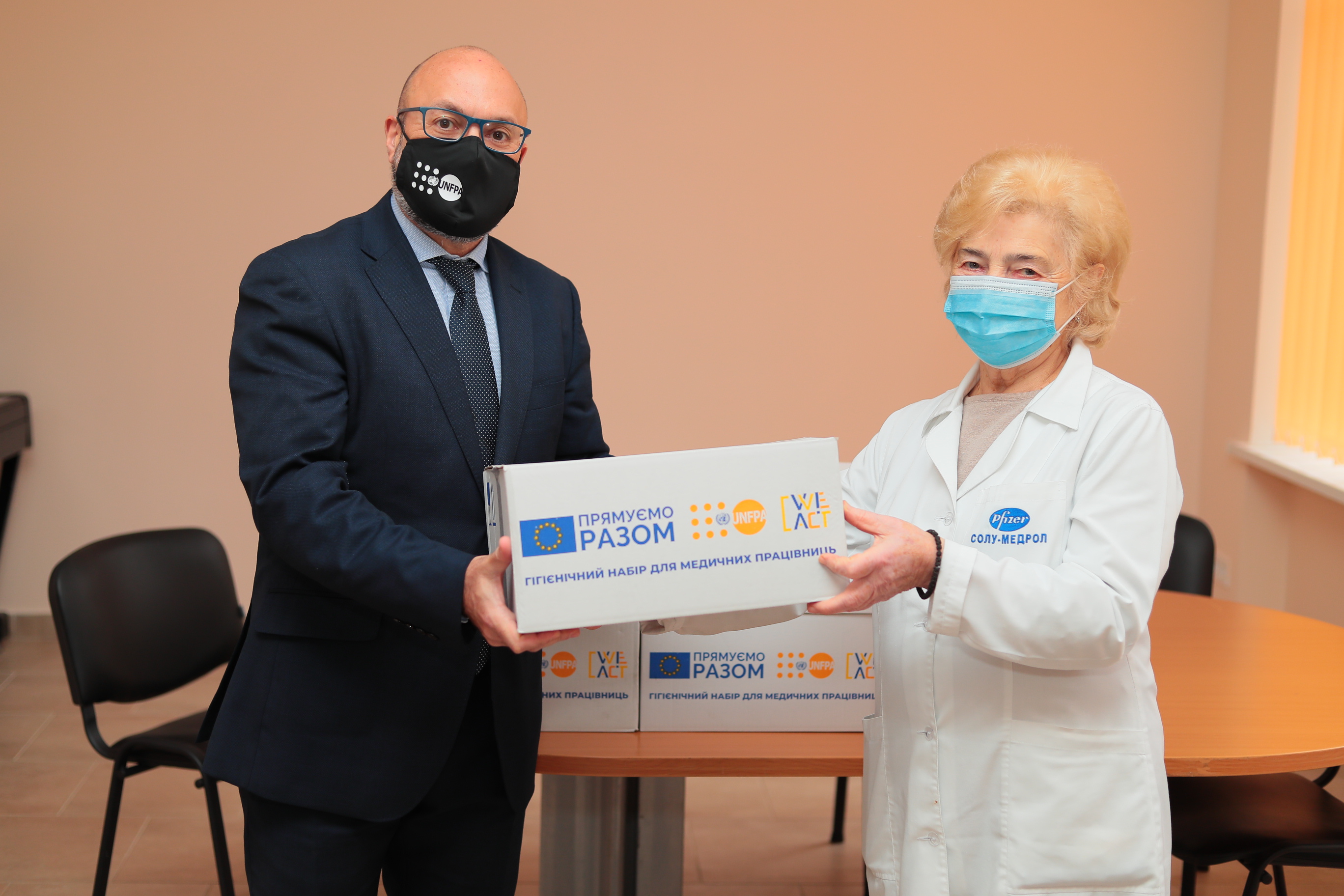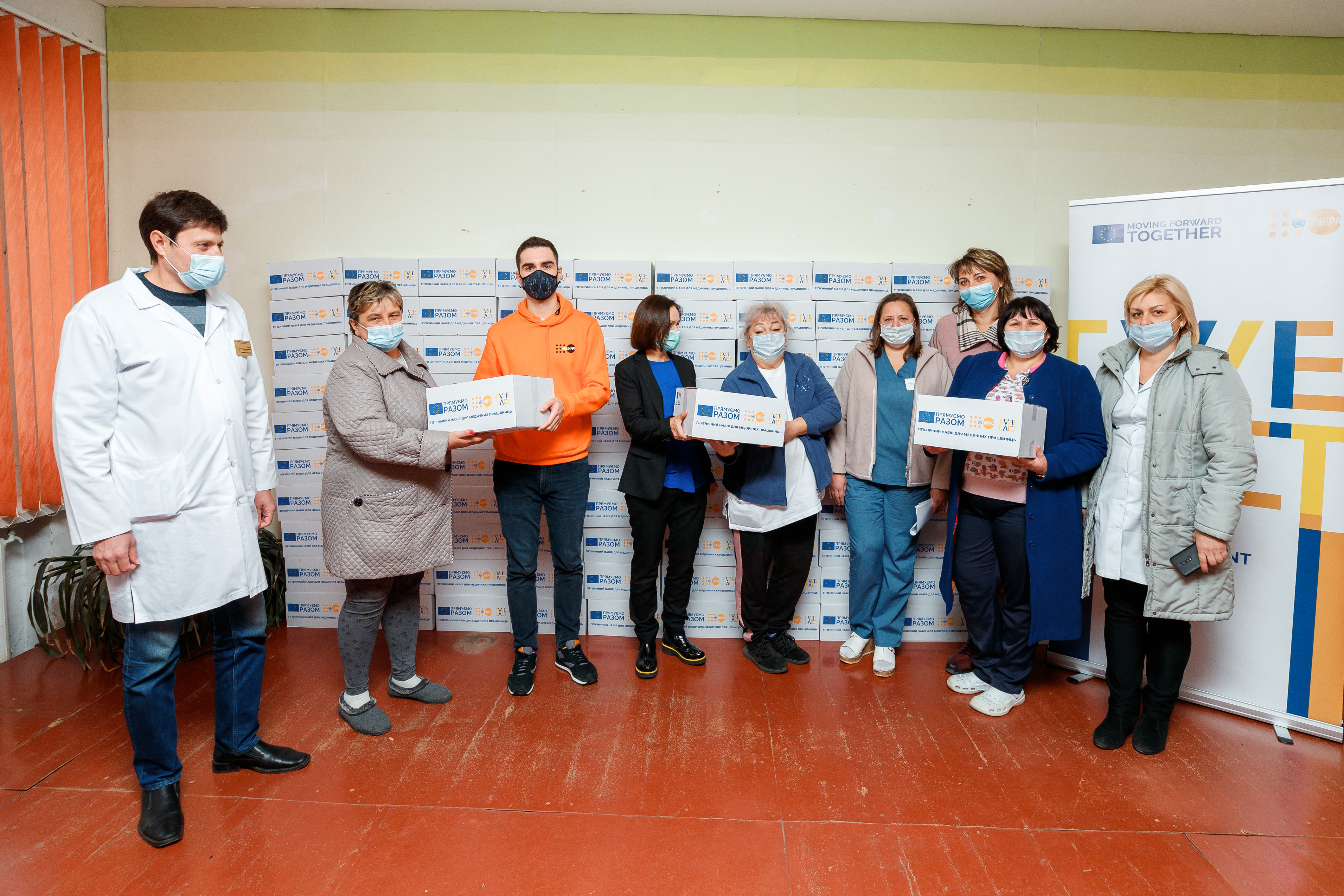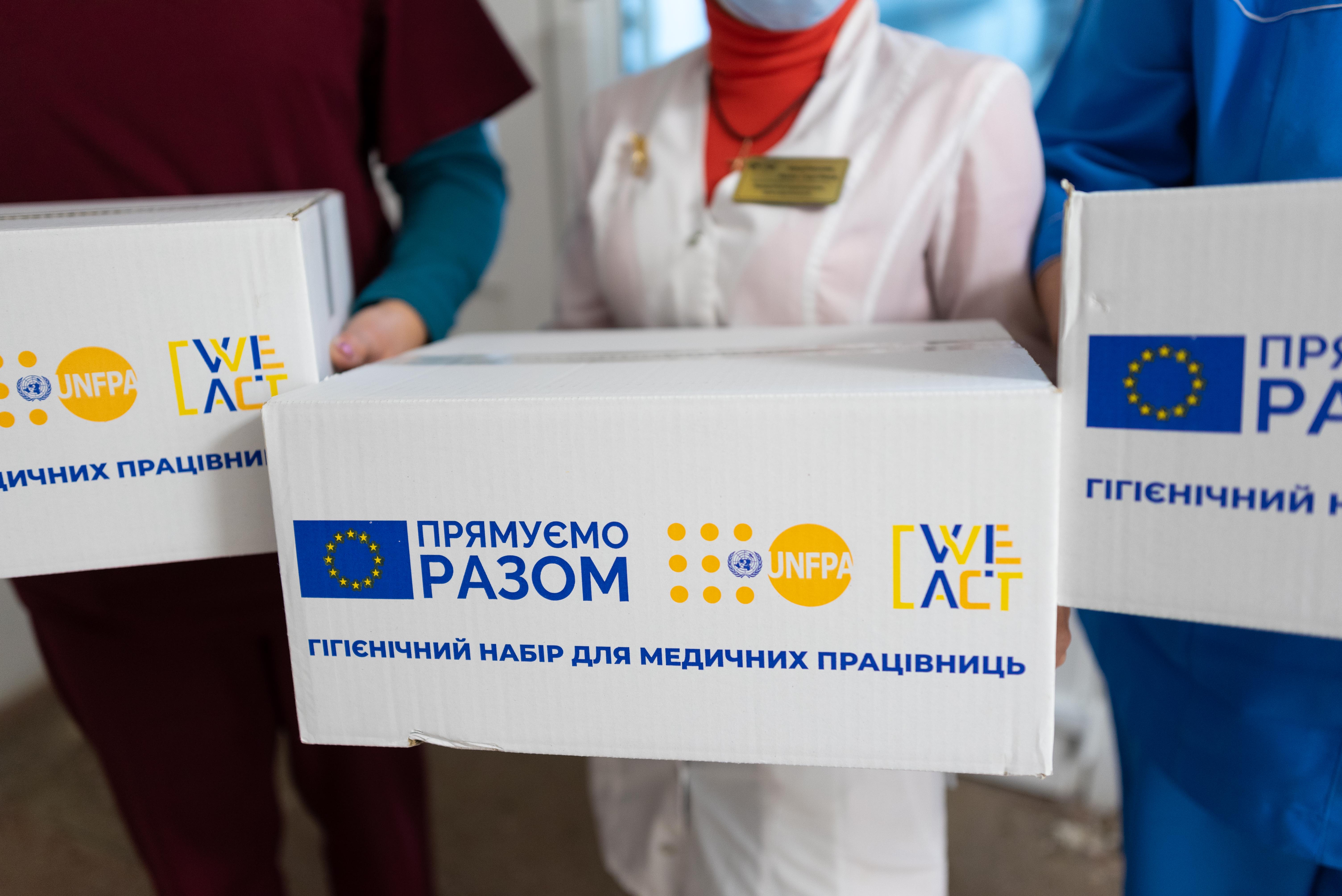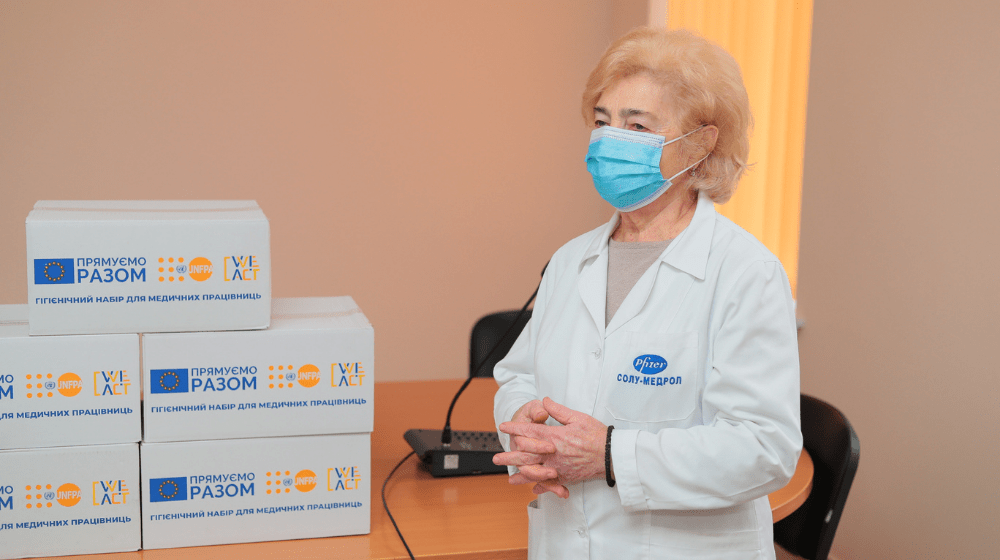Halyna, chief of medicine,
Volyn Regional Infectious Diseases Hospital, Lutsk
Ukrainians have been living with the COVID-19 pandemic for almost two years now, and this period has significantly changed the entire country’s lives. Since the disease came to Ukraine, 4.13 million cases have been registered, and about a hundred thousand people have died from it. The pandemic has not only damaged the economy but has also affected society as a whole.
However, COVID-19 has had a more substantial impact on women, especially health workers, who have been at the forefront of the fight against the disease since day one. This is true for infectious disease doctors and for all hospital staff: nurses, paramedics, and other medical personnel. With the spread of the virus in Ukraine, the number of medical personnel on the pandemic frontlines increased as more and more hospitals were designated to fight COVID-19. Infectious disease departments and hospitals were the first to accept patients with coronavirus, and it is these departments that work with critically ill patients, which adds to the difficulties, including psychological ones.
Halyna is the chief of medicine of the Volyn Regional Infectious Diseases Hospital, which has been providing care to patients with COVID-19 since the beginning of the pandemic. Now, the incidence in the region has generally decreased, but from September to November, the hospital received many patients. In total, 103,000 cases were recorded in the Volyn region during the pandemic, and more than 2,000 people died.
The already challenging work of medical professionals is complicated by the need to use numerous personal protective equipment when working with patients infected with COVID-19. Such equipment includes, for example, masks, protective suits, antiseptics, gloves, shields. For those who work in an infectious disease hospital, such tools are not new, but it does not mean that it is much easier for staff to work.
"The profession of an infectious disease specialist is associated with compliance with disinfection, the requirements of the anti-epidemic regime. Coronavirus infection is a dangerous one, so it is necessary to provide care to patients with the use of personal protective equipment", - says Ms. Halyna about the atmosphere in her hospital.
The constant use of personal protective equipment not only complicates work or creates psychological and physical discomfort. Such working conditions can affect personal hygiene, damage the skin, cause redness, peeling, dermatitis, and more. Prolonged exposure to protective suits, respirators, and gloves can be detrimental to health care workers, as this equipment, as well as the pace and complexity of working with COVID-19 patients, complicate personal hygiene, particularly during menstruation.
To help solve this problem and support health workers involved in the fight against coronavirus, the United Nations Population Fund and the European Union distributed 5,000 sanitary kits to Ukrainian hospitals. Implemented under the WE ACT: Women Empowerment Action program, this help package aims to minimise the negative impact of continued personal protective equipment usage on the health and comfort of women working at the forefront of COVID-19.

Photo credit: UNFPA Ukraine/Andrii Krepkyh
The kits received by medical workers in various regions of Ukraine include, in particular, body cleansers, deodorants, pads, underwear. Employees of the hospital run by Ms. Halyna also received such kits. They are essential because each doctor needs time to satisfy their personal needs.
Women in Ukraine make up 83% of health workers: that is why the pandemic has seriously affected women. The hospital where Halyna works is no exception: a total of 212 doctors work at the Volyn Regional Infectious Diseases Hospital, and 208 of them are women. The kits distributed to hospitals are designed to make it easier for female medical staff to help maintain health and hygiene.
As a leader, Halyna sees the challenges of the pandemic from different angles. In particular, healthcare workers faced organisational challenges during the COVID-19 outbreak.
"The coronavirus pandemic coincided with the reform of the medical system. This has created new challenges for staff, organisational changes", says Halyna about the peculiarities of work in this almost two-year period.
The work of a medic in a pandemic is exhausting at all levels. Halyna and her colleagues miss the "pre-COVID" life in one way or another - they very much hope that they will return to the previous mode of work very soon.
No matter how stable and psychologically resilient medical workers are, long-term work with a dangerous disease is morally and physically exhausting. Staff have to face death, human grief, working to the limit. Since the incidence rate is growing once again, the support of medical professionals is crucial.
It is too early to sum up the final results of the pandemic's impact on the world, but it can already be said that it was the health workers who, having been working in an extremely difficult mode for almost two years, felt it most strongly. And despite all the challenges: personal, sanitary, organisational - doctors continue to help and save lives.
Olena, senior nurse,
Zolotonosha Central District Hospital, Zolotonosha, Cherkasy region
It is too early to give a final and complete assessment of all the effects of the pandemic on society, but what can be said with certainty is that all this time the biggest blow is kept by medical workers. Not only infectious diseases hospitals and departments are working hard, but also general hospitals and other departments that have been assigned to work with patients with COVID-19.
It may seem that it should be easier for the staff of infectious diseases hospitals to work during the pandemic - because they are prepared and are used to working with viruses and other diseases. However, this is not entirely true, as such wards often treat patients that are more severe cases. And the fight for the lives of such patients is always difficult and emotionally exhausting.
This is exactly the situation in the hospital where Olena works. Their department of the Zolotonosha Central District Hospital in the Cherkasy region is equipped with the so-called "direct oxygen", so patients arrive in severe or moderate conditions. Due to this, there is no significant relief compared to previous months. Olena calls the last wave of COVID-19 the most difficult one - the one that started in autumn 2021.
The department where Olena works employs about 35 women in various positions: nurses, paramedics, doctors. In another department, which also works with patients with COVID-19, there are about the same number of female healthcare workers. Almost all the staff of the departments are women, with less than a dozen men.

Photo credit: UNFPA Ukraine/Andrii Krepkyh
When working in difficult pandemic conditions, medical workers have almost no time for personal needs because the work requires constant concentration, emotional and physical stress. In addition, the situation is complicated by personal protective equipment, which must be worn constantly. And although suits, shields, masks, and gloves protect against the spread of the virus, their constant presence harms the skin and membranes.
To alleviate the discomfort of female healthcare workers, the United Nations Population Fund and the European Union have purchased and distributed about 5,000 hygiene kits to hospital workers under the WE ACT: Women Empowerment Action program to the regions where hospitals are most busy with COVID-19 patients. Olena and her colleagues also received such sets in Zolotonosha.
"We have an infectious disease department, so we always work with personal protective equipment", says Olena. "During COVID-19, only overalls were added. Thus, we are used to working with antiseptics and other equipment. However, it is truly difficult to work in the overalls".
The department is already "toughened up" by working with various diseases, including hepatitis and other serious infections. However, the work during the coronavirus pandemic has become more burdensome, so Olena and her colleagues are grateful for the hygiene kits they received. They had everything workers needed every day, so everyone truly needed them.
As the majority - over 80% - of healthcare workers in Ukraine are women, hygiene kits, including underwear, deodorants, pads, body cleansers, etc., are essential for improving working conditions of women on the frontline of the COVID-19 pandemic.
And although Olena speaks calmly and thoughtfully, even jokes, she notes that working with patients with COVID-19 is especially difficult.
"You are exhausted both morally and physically. Since the patients are really in a serious condition", - Ms. Olena adds in a tired voice.
In total, two and a half thousand people died of coronavirus disease in the Cherkasy region as of the end of 2021. Behind every death, there is the grief of families and the struggle that leaves its mark on healthcare workers.
Talking about rest and time for personal needs, Olena is not saying much but states that she would like to have a longer vacation. For her, as for many of her colleagues, this is an opportunity to take a break from the hard work of the last two years, especially considering that Olena and her department work with critically ill patients. Of course, they would like to rest more, but work is work.
At the end of the conversation, Olena wishes everyone to stay healthy. No matter how difficult it is to work with COVID-19, doctors are finding the strength to stay fit and work to advance Ukraine's defense against the coronavirus pandemic.
Yulia, senior nurse,
Zaporizhzhia City Hospital №9, Zaporizhzhia
An endless flow of patients. Heavy workload. That is how every hospital in Ukraine that accepts patients with COVID-19 works, and Ms Yulia's hospital is no exception.
Yulia works as a senior nurse in Zaporizhzhia. At the time of the conversation, the situation had improved, the incidence rate had decreased, but moderate patients continued to arrive. But at least the hospital's beds are not as busy - there was a decline in the disease.
A total of 181,000 cases of the disease had been registered in the Zaporizhzhia region by the time of our conversation. Just over 5,000 people have died from COVID-19 here. At the end of December 2021, the region is still in the "red" quarantine zone - this situation has been like this since October. The autumn wave was the most difficult for Yulia and her department - the Delta strain was raging.
And while the pandemic has affected all people, women have been more negatively affected by restrictions and pressure on the health care system. The fact that there are statistically more female workers than male workers is an example of this - and this pattern is true for Yulia's hospital as well. Moreover, all employees in her department are women.
"When you run to the intensive care unit, you forget everything in the world, you grab, you run, you pull - just to save the patient," - says Ms Yulia about her department, smiling. She says that there is no way they, women, are different from their male colleagues.
However, even though health workers have already been working at this pace of operation for the whole pandemic, they feel tired. The hard work of doctors is multiplied by the need to work in protective suits, shields in the process of rescuing critically ill patients.
"Patients continue to come, remain in the hospital. We have been working at this pace for so long that it seems to us that we will not get out of this difficult regime. It seems that everyone here has already overcome the difficulties and we can work with anything”, says Yulia.
To help and support women in the pandemic, the European Union and the United Nations Population Fund in Ukraine have distributed thousands of women's hygiene kits to hospitals as part of the WE ACT: Women Empowerment Action program. Kits consist of the most necessary and important means of personal hygiene: deodorants, pads, underwear, skin cleansers. After all, working in personal protective equipment is very difficult and has a negative effect, for example, on the skin.
"Personal protective equipment is burdensome to work with", confirms Yulia. “Because you rush to the patients, you have to move a lot in this equipment. I work as a senior nurse: someone’s condition is deteriorating, you jump up, forget that you have to put the equipment on, you run in masks, gloves since you have to save the patient. It is also very difficult to work in shields and masks because you are near the patient for 24 hours. It is challenging to perform with all this PPE. Therefore, we hope that this pandemic will end soon".
Yulia's department notes the benefits of such hygienic kits. Employees are grateful for the attention given to the special needs of women, as personal hygiene issues in the context of reproductive health are usually not given enough attention. There are handy items inside the kits: T-shirts, hygiene products, etc., because nurses spend a lot of time at work.

Photo credit: UNFPA Ukraine/Andrii Potapov
The hospital staff is happy that they have support not only from each other but also from the outside. After all, working with patients with COVID-19 is exhausting: both physically and psychologically.
Her colleagues for Yulia are the only bright moment of the pandemic. All the workers are very friendly and work side by side, so the team is something that gives a good impression because in the work with COVID-19 there is little positive: people die. Thus, health professionals at this time are as if between life and death.
What Yulia misses the most is how she and her colleagues used to work before, in the "pre-COVID" times, the former pace and style of work. Yulia and her colleagues are tired of this disease and the constant stress of working with COVID-19.
"We are already tired of tears: you look at these relatives, you want to help them - but we are already doing everything we can. We want to return to our usual pace. We hope that all this will end soon", Yulia adds wearily, but with hope in her voice.
The department is waiting for annual leave - at least two weeks to rest from the constant stress of working with patients. It is a vacation that allows you to be distracted from work and switch your thoughts to something good, to rest. But in Yulia's department, everyone loves and enjoys their work and the vacation they have, even if sometimes they want it to be longer.
The dream and desire of everyone in the department where Yulia works is for the pandemic to end as soon as possible and for them and all people to be able to return to normal life. Yulia and her colleagues call on everyone to get vaccinated and protect themselves because that is how you can stop the disease.
"We want to make sure that everyone is vaccinated and follows the rules. I don’t understand the position that vaccination is not necessary. This vaccine is needed, and quarantine rules must be followed. Because it is very scary when patients die in front of you, in your arms”, Yulia urges.
It is unknown how long the COVID-19 pandemic will last and what consequences it will have. Each of us can help medical staff with quarantine and vaccination – thus, we can stop the spread of the disease. After all, the work of a doctor in the days of COVID-19 is a constant struggle and response to challenges, multiplied by the need for personal protective equipment and physical activity.


